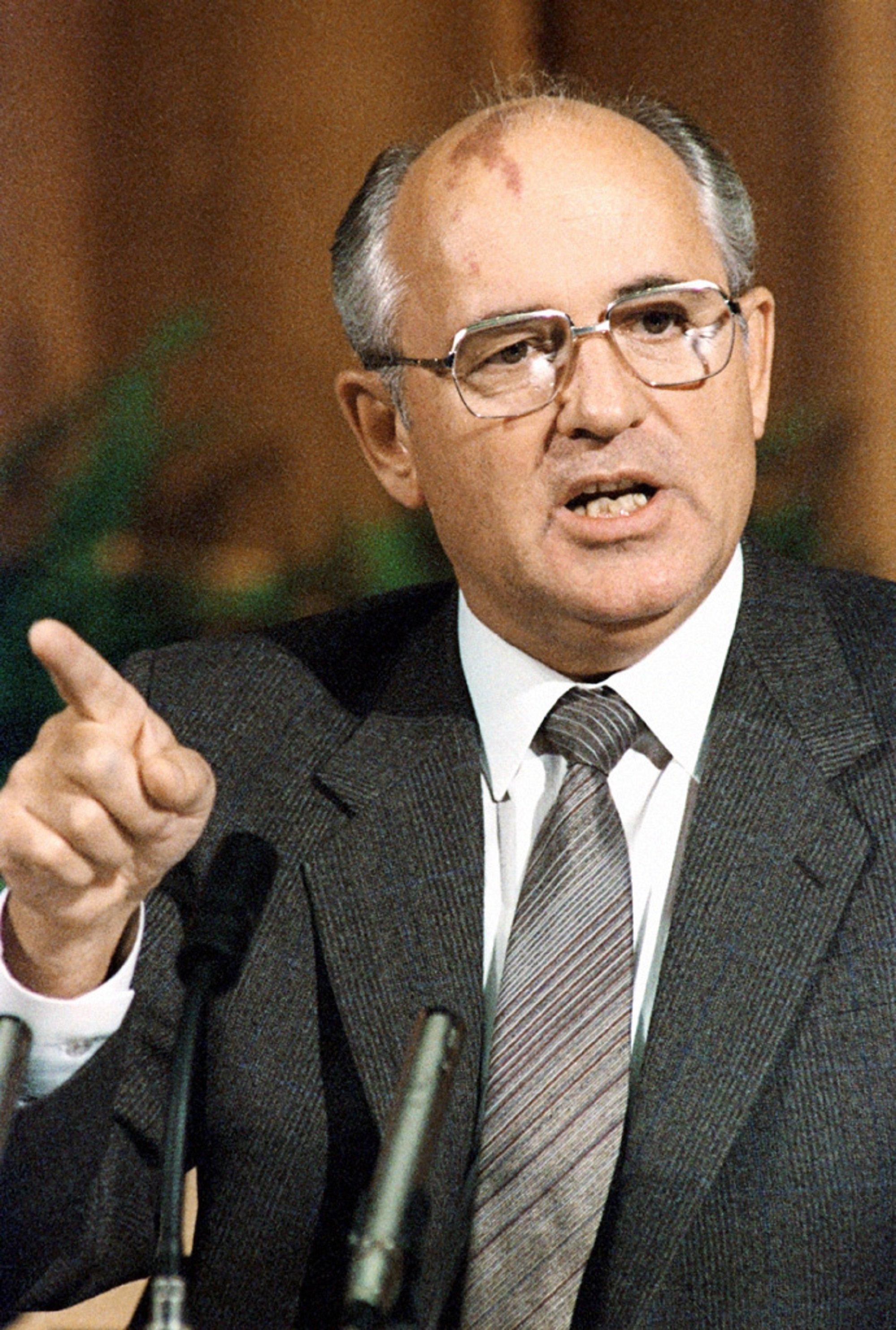Born 2 March 1931, Mikhail Gorbachev was the last leader of the Soviet Union.
 The Youngest First Secretary
The Youngest First Secretary
Mikhail Gorbachev was an up-and-coming star in the Communist Party and, following the death of Leonid Brezhnev in 1982, became a protégé of the new Party leader, Yuri Andropov. But on Andropov’s death in February 1984, the post of First Secretary fell, not to Gorbachev, but to the aging Konstantin Chernenko. However, Gorbachev spread his influence further so when Chernenko died after only thirteen months as leader, the post finally fell to him. Aged 54, Gorbachev was the youngest First Secretary in Soviet history, and the first to be born after the Russian Revolution of 1917.
His youth and progressive ideas alarmed the Communist hardliners and traditionalists, whose fears were confirmed when Gorbachev ushered in a reformist programme, and introduced into the political lexicon the words perestroika (reconstruction) and glasnost (openness). The Soviet’s system inept handling of the Chernobyl crisis highlighted the need for reform.
“I like Mr Gorbachev”
The international community welcomed the appointment of a man who seemed open and not ruled by cloak and dagger diplomacy and mistrust. Margaret Thatcher said of him, “I like Mr Gorbachev, we can do business together.”
Immediately on coming to power Gorbachev was proposing a reduction in the number of nuclear arms held between the superpowers. In November 1985 Gorbachev met US president, Ronald Reagan, for the first time. Reagan, who had referred to the Soviet Union as the “evil empire”, was also impressed by the new man in the Kremlin.
In January 1986 Gorbachev made what is known as his ‘January Proposal’ by proposing a radical strategy for removing all nuclear weapons by 2000. Another meeting with Reagan in October 1986 brought this deadline forward to 1996.
Through their several meetings, Reagan and Gorbachev helped ease international tension. Despite their ideological and cultural differences, the two men build a rapport that was to have a real and lasting effect on the ending of the Cold War.
“We can’t go on living like this”
“We can’t go on living like this,” was Gorbachev’s considered summary of life in 1980s Soviet Union. The economy lagged behind that of the West, the people lived in poverty and without hope. The cost of being a superpower was crippling – the commitment to conventional and nuclear arms, the funding of communist regimes elsewhere in the world, and the costly and unpopular war in Afghanistan were all taking their toll on the economy and the everyday lives of the Soviet citizen.
Initially, Gorbachev increased spending on Afghanistan, hoping that a deeper commitment would bring about a decisive outcome and shorten the war. Although Soviet troops did benefit in the short term by penetrating deeper into the Mujahedeen heartlands, they were unable to sustain the initiative and would subsequently lose the ground they fought so hard to win.
Referring to Afghanistan as a “bleeding wound”, Gorbachev admitted defeat and in 1988 announced the Soviet Union’s withdrawal from a conflict that had become their ‘Vietnam’. A year later, in February 1989, the last Soviet soldier left Afghanistan.
At home, Gorbachev toured the country, met its workers and, as no Soviet leader had done before, listened.
An “instrument of foreign policy”
On the eve of 1989, Gorbachev delivered a speech to the UN that acted as the starting pistol for the tumultuous change in Eastern Europe. He talked of nations having the right to freedom of choice: “the threat of force cannot be and should not be an instrument of foreign policy.” As a backup to his words, he promised the withdrawal of troops from the Soviet satellites.
Following the fall of the Berlin Wall and the break-up of the Eastern Bloc, the Baltic states of Lithuania, Estonia and Latvia (unwilling and resentful Soviet satellites since Stalin’s annexation at the start of the Second World War) all declared themselves independent. But Gorbachev, not wanting to see the break-up of the union, resisted.
In Russia, demonstrations in Moscow called for the end of one-party rule. In June 1990, Boris Yeltsin, recently elected Mayor of Moscow, was also elected president of the Russian Federation, stating that Russian legality took precedence over the Soviet Union’s. Yeltsin was determined to finish off the Communist Party, and with it the Soviet Union.
On 19 August 1991, the remaining communist hardliners within the Kremlin decided that Gorbachev was no longer the man to lead the Communist Party. Gorbachev, on holiday on the Black Sea, was declared too ill to perform his duties and placed under house arrest. The hardliners imposed emergency rule but lacked the support to succeed in their coup.
On 8 December 1991, Yeltsin, on behalf of Russia and with other former Soviet republics, formed the Commonwealth of Independent States, the CIS. The Union of Soviet Socialist Republics had ceased to exist. On Christmas Day the hammer and sickle flag of the Soviet Union was lowered over the Kremlin for the last time as Gorbachev delivered his farewell speech: “The threat of a world war is no more.”
2022 Update: Mikhail Gorbachev died aged 91 on 30 August 2022 following a ‘severe and prolonged illness’.
 Rupert Colley.
Rupert Colley.
Read more about the Cold War in The Clever Teens’ Guide to the Cold War (75 pages) available as paperback and ebook from Amazon, Barnes & Noble, Waterstone’s, Apple Books and other stores.